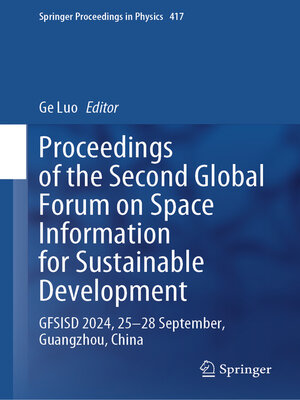Proceedings of the Second Global Forum on Space Information for Sustainable Development
ebook ∣ GFSISD 2024, 25–28 September, Guangzhou, China · Springer Proceedings in Physics
By Ge Luo

Sign up to save your library
With an OverDrive account, you can save your favorite libraries for at-a-glance information about availability. Find out more about OverDrive accounts.
Find this title in Libby, the library reading app by OverDrive.



Search for a digital library with this title
Title found at these libraries:
| Library Name | Distance |
|---|---|
| Loading... |
This proceedings book gathers the latest research presented at the Second Global Forum on Space Information for Sustainable Development (GFSISD 2024) which hosted by China Association of Remote Sensing Application (CARSA), supported by Guangzhou Association For Science & Technology and took place in Guangzhou, Guangdong Province, China, from September 25th to 28th, 2024". The forum aimed to investigate the important role of remote sensing in fostering environmental conservation and sustainable development. Both the forum and this proceedings volume address interdisciplinary areas including space information, earth system science, social sciences, economics, and sustainable development. It highlights the enhanced application of spatial information and big data derived from remote sensing in areas such as climate change response, disaster risk reduction, food security, energy and resource management, environmental protection, biodiversity preservation, public health, traffic management, and ocean monitoring.
The book provides extensive coverage of three specific goals within the United Nations' 2030 Agenda for Sustainable Development: Goal 2—Zero Hunger, which encompasses sustainable agriculture; Goal 14—Life Below Water, which emphasizes the sustainable use of marine resources; and Goal 15—Life On Land, which focuses on the sustainable use of terrestrial ecosystems. Furthermore, the publication covers the methodologies and applications of remote sensing sensors (both optical and radar) that contribute to sustainability efforts.
Contributors to these proceedings include distinguished scholars and industry leaders from across the globe. This collection serves as a valuable resource for researchers, students, professionals, and policymakers involved in space science, information science, earth and environmental sciences, and sustainable development.







